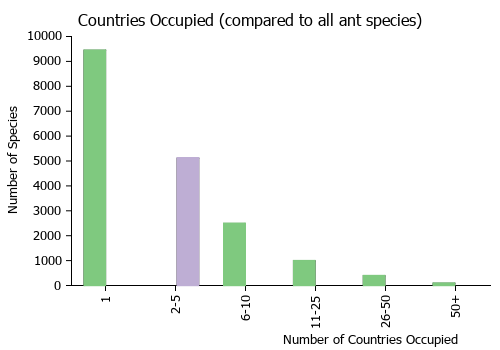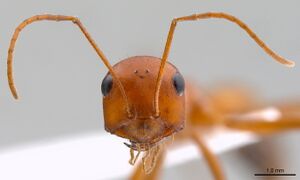Cataglyphis setipes
| Cataglyphis setipes | |
|---|---|

| |
| Scientific classification | |
| Kingdom: | Animalia |
| Phylum: | Arthropoda |
| Class: | Insecta |
| Order: | Hymenoptera |
| Family: | Formicidae |
| Subfamily: | Formicinae |
| Tribe: | Formicini |
| Genus: | Cataglyphis |
| Species group: | bicolor |
| Species: | C. setipes |
| Binomial name | |
| Cataglyphis setipes (Forel, 1894) | |
| Synonyms | |
| |
This species inhabits subtropical areas and is relatively easy to find because they preferentially occupy open habitats. These ants have been observed to form permanent nests in dry soil; nests can be easily located in bare ground and along roadside. Workers of this species usually forage individually and raise gaster in locomotion (Wachkoo & Bharti, 2015). Pashaei Rad et al. (2018) found this species in Iran on the ground in a moderate rainfall area.
Identification
Keys including this Species
Distribution
Latitudinal Distribution Pattern
Latitudinal Range: 41.508577° to 25.2666°.
| North Temperate |
North Subtropical |
Tropical | South Subtropical |
South Temperate |
- Source: AntMaps
Distribution based on Regional Taxon Lists
Oriental Region: India (type locality), Pakistan.
Palaearctic Region: Azerbaijan, Iran, Türkiye.
Distribution based on AntMaps
Distribution based on AntWeb specimens
Check data from AntWeb
Countries Occupied
| Number of countries occupied by this species based on AntWiki Regional Taxon Lists. In general, fewer countries occupied indicates a narrower range, while more countries indicates a more widespread species. |

|
Estimated Abundance
| Relative abundance based on number of AntMaps records per species (this species within the purple bar). Fewer records (to the left) indicates a less abundant/encountered species while more records (to the right) indicates more abundant/encountered species. |

|
Biology
In Turkmenistan this species is parasitized by the ant Cataglyphis zakharovi.
Castes
Images from AntWeb
 
| |
| Worker. Specimen code antweb1008064. Photographer Elham Kashani, uploaded by California Academy of Sciences. | Owned by ULM, Universität Ulm, Ulm, Germany. |
Nomenclature
The following information is derived from Barry Bolton's Online Catalogue of the Ants of the World.
- setipes. Myrmecocystus viaticus r. setipes Forel, 1894c: 401 (w.) INDIA (Rajasthan, Uttar Pradesh, Madhya Pradesh).
- Ruzsky, 1902d: 9 (q.m.); Imai, et al. 1984: 9 (k.).
- Combination in Cataglyphis: Wheeler, W.M. 1922a: 945.
- Subspecies of viatica: Ruzsky, 1902d: 9; Forel, 1904b: 382; Ruzsky, 1905b: 430; Wheeler, W.M. 1922a: 945.
- Subspecies of bicolor: Emery, 1906d: 58; Emery, 1908g: 217; Karavaiev, 1910b: 39; Karavaiev, 1912b: 591; Emery, 1925b: 266; Santschi, 1929b: 49; Karavaiev, 1932: 250; Eidmann, 1942: 254.
- Status as species: Bingham, 1903: 312; Mukerjee, 1930: 162; Chapman & Capco, 1951: 203; Collingwood, 1961a: 65; Collingwood, 1961b: 289; Arnol'di, 1964: 1804; Pisarski, 1967: 418; Pisarski, 1970: 324; Tarbinsky, 1976: 199; Arnol'di & Dlussky, 1978: 554 (in key); Dlussky, 1981a: 18; Dlussky, Soyunov & Zabelin, 1990: 155; Agosti, 1990b: 1490; Bolton, 1995b: 137; Radchenko, 1997c: 434; Radchenko, 1998: 504 (in key); Tiwari, 1999: 67; Mathew & Tiwari, 2000: 345; Schultz, R. et al. 2006: 205; Paknia, et al. 2008: 154; Kiran & Karaman, 2012: 10; Borowiec, L. 2014: 60; Wachkoo & Bharti, 2015a: 3 (redescription); Bharti, Guénard, et al. 2016: 27; Khalili-Moghadam, et al. 2019: 169.
- Senior synonym of dschambulica: Radchenko, 1997c: 435.
- [Note: Radchenko, 1997c: 435, gave longipedem as junior synonym of setipes, but if the synonymy is correct then longipedem takes priority.]
- Material of the unavailable name setipesdesertorum referred here by Radchenko, 1997c: 435.
Description
Karyotype
- 2n = 52, karyotype = 12M+40A (India) (Imai et al., 1984) (at figure subtitle it is mentioned 2n=54 but it may be a mistake since the formula is correct as desbribed in the results and the karyotype has 26 chromosome pairs).
References
- Bharti, H., Sharma, Y.P., Kaur, A. 2009. Seasonal patterns of ants (Hymenoptera: Formicidae) in Punjab Shivalik. Halteres 1: 36-47.
- Borowiec, L. 2014. Catalogue of ants of Europe, the Mediterranean Basin and adjacent regions (Hymenoptera: Formicidae). Genus (Wroclaw) 25(1-2): 1-340.
- Khalili-Moghadam, A., Salata, S., Borowiec, L. 2021. Three new species of Cataglyphis Foerster, 1850 (Hymenoptera, Formicidae) from Iran. ZooKeys 1009, 1–28 (doi:10.3897/zookeys.1009.59205).
- Khalini-Moghadam, A., Borowiec, L., Nemati, A. 2019. New records of ants (Hymenoptera: Formicidae) from the Chaharmahal va Bakhtiari Province of Iran with taxonomic comments. Polish Journal of Entomology 88: 163–182 (DOI 10.2478/pjen-2019-0013).
- Kiran, K., Karaman, C. 2020. Additions to the ant fauna of Turkey (Hymenoptera, Formicidae). Zoosystema 42(18), 285-329 (doi:10.5252/zoosystema2020v42a18).
- Pashaei Rad, S., Taylor, B., Torabi, R., Aram, E., Abolfathi, G., Afshari, R., Borjali, F., Ghatei, M., Hediary, F., Jazini, F., Heidary Kiah, V., Mahmoudi, Z., Safariyan, F., Seiri, M. 2018. Further records of ants (Hymenoptera: Formicidae) from Iran. Zoology in the Middle East 64, 145-159 (doi:10.1080/09397140.2018.1442301).
- Rasheed, M.T., Bodlah, I., Fareen, A.G., Wachkoo, A.A., Huang, X., Akbar, S.A. 2019. A checklist of ants (Hymenoptera: Formicidae) in Pakistan. Sociobiology 66(3), 426-439 (doi:10.13102/sociobiology.v66i3.4330).
- Rasheed, S.B., Ali, M., Zaidi, F., Noreen, S. 2020. Diversity of ants (Hymenoptera: Formicidae) in residential area of Tarbela, Swabi: New recrds from Pakistan. The Journal of Animal and Plant Sciences 31: 617-624 (doi:10.36899/japs.2021.2.0250).
- Snegovaya, N., Shigayev, C. 2021. A checklist of the ants (Insecta, Formicidae) of Azerbaijan Republic. Iranian Journal of Animal Biosystematics 17(2): 179-207 (doi:10.22067/ijab.2022.67343.1000).
- Stukalyuk, S., Radchenko, A., Akhmedov, A., Reshetov, A., Netsvetov, M. 2021. Acquisition of invasive traits in ant, Crematogaster subdentata Mayr (Hymenoptera: Formicidae) in urban environments. Serangga 26: 1-29.
- Wachkoo, A., Bharti, H. 2015. Taxonomy and distribution of the ant Cataglyphis setipes (Hymenoptera: Formicidae). Biodiversity Data Journal 3: e4447 (doi: 10.3897/BDJ.3.e4447).
References based on Global Ant Biodiversity Informatics
- Agosti D. 1990. Review and reclassification of Cataglyphis (Hymenoptera, Formicidae). Journal of Natural History 24: 1457-1505.
- Bharti H., Y. P. Sharma, and A. Kaur. 2009. Seasonal patterns of ants (Hymenoptera: Formicidae) in Punjab Shivalik. Halteres 1(1): 36-47.
- Borowiec L. 2014. Catalogue of ants of Europe, the Mediterranean Basin and adjacent regions (Hymenoptera: Formicidae). Genus (Wroclaw) 25(1-2): 1-340.
- Brown W. L., Jr. 1959. Appendix G. Insecta collected by the expedition. Pp. 229-230 in: Field, H. 1959. An anthropological reconnaissance in West Pakistan, 1955, with appendixes on the archaeology and natural history of Baluchistan and Bahawalpur. Papers of the Peabody Museum of Archaeology and Ethnology, Harvard University 52:i-xii,1-332.
- Chhotani O. B., and K. K. Ray. 1976. Fauna of Rajasthan, India, Hymenoptera. Records of the Zoological Survey of India 71: 13-49.
- Collingwood C. A. 1961. The third Danish Expedition to Central Asia. Zoological Results 27. Formicidae (Insecta) from Afghanistan. Videnskabelige Meddelelser fra Dansk Naturhistorisk Forening 123: 51-79.
- Collingwood, C. A.. "The third Danish Expedition to Central Asia. Zoological Results 27. Formicidae (Insecta) from Afghanistan." Videnskabelige Meddelelser fra Dansk Naturhistorisk Forening 123 (1961): 51-79.
- Dlussky G. M., O. S. Soyunov, and S. I. Zabelin. 1990. Ants of Turkmenistan. Ashkabad: Ylym Press, 273 pp.
- Ghosh S. N., S. Sheela, B. G. Kundu, S. Roychowdhury, and R. N. Tiwari. 2006. Insecta: Hymenoptera: Formicidae. Pp. 369-398 in: Alfred, J. R. B. (ed.) 2006. Fauna of Arunachal Pradesh. (Part -2). [State Fauna Series 13.]. New Delhi: Zoological Survey of India, iv + 518 pp.
- Imai H. T., C. Baroni Urbani, M. Kubota, G. P. Sharma, M. H. Narasimhanna, B. C. Das, A. K. Sharma, A. Sharma, G. B. Deodikar, V. G. Vaidya, and M. R. Rajasekarasetty. 1984. Karyological survey of Indian ants. Japanese Journal of Genetics 59: 1-32.
- Kaplin V. G. 1989. On the fauna and ecology of ants (Hymenoptera, Formicidae) in the Repetek Biosphere Reserve (eastern Karakum). Izvestiya Akademii Nauk Turkmenskoi SSR. Seriya Biologicheskikh Nauk 1989(3): 40-47.
- Khalili-Moghadam A., L. Borowiec, and A. Nemati. 2019. New records of ants (Hymenoptera: Formicidae) from the Chaharmahal va Bakhtiari Province of Iran with taxonomic comments. Polish Journal of Entomology 88 (2): 163–182.
- Kuznetsov G. T. 1990. Comparative analysis of Hymenoptera (Formicidae) population on altitudinal zones of central Kopetdag. Izvestiya Akademii Nauk Turkmenskoi SSR. Seriya Biologicheskikh Nauk 1990(3): 64-67.
- Marikovsky P. I. 1979. Ants of the Semireche Desert. [In Russian.]. Alma Ata: Nauka, 263 pp.
- Mokrousov M. V., and V.A. Zryanin. 2015. Materials on the early spring wasps and ants fauna of Uzbekistan (Hymenoptera: Vespomorpha: Chrysidoidea, Scolioidea, Pompiloidea, Vespoidea, Apoidea [Spheciformes], Formicoidea). Entomological research Russia and its neighboring regions 5: 36–48.
- Paknia O., A. Radchenko, H. Alipanah, and M. Pfeiffer. 2008. A preliminary checklist of the ants (Hymenoptera: Formicidae) of Iran. Myrmecological News 11: 151-159.
- Pashaei Rad S., B. Taylor, R. Torabi, E. Aram, G. Abolfathi, R. Afshari, F. Borjali, M. Ghatei, F. Hediary, F. Jazini, V. Heidary Kiah, Z. Mahmoudi, F. Safariyan, and M. Seiri. 2018. Further records of ants (Hymenoptera: Formicidae) from Iran. Zoology in the Middle East 64(2): 145-159.
- Radchenko A. G. 1998. A key to ants of the genus Cataglyphis Foerster (Hymenoptera, Formicidae) from Asia. Entomological Review (Birmingham) 78: 475-480.
- Radchenko, A. G.. "Cataglyphis zakharovi sp. n. - second socially parasitic species in the genus Cataglyphis Förster (Hymenoptera, Formicidae)." Annales Zoologici (Warsaw) 46 (1997): 207-210.
- Radchenko, A.G. 1998. A key to ants of the genus Cataglyphis Foerster (Hymenoptera: Formicidae) from Asia. Entomological Review 78(4):475-480.
- Rasheed M. T., I. Bodlah, A. G. Fareen, A. A. Wachkoo, X. Huang, and S. A. Akbar. 2019. A checklist of ants (Hymenoptera: Formicidae) in Pakistan. Sociobiology 66(3): 426-439.
- Tak N. 1995. Studies on ants (Formicidae) of Rajasthan - 1 Jodhpur. Hexapoda 7(1): 17-28.
- Tak N. 2008. Ants of Rajasthan. Conserving Biodiversity of Rajasthan Zool. Surv. India. 149-155.
- Tak N., and N. S. Rathore. 1996. Ant (Formicidae) fauna of the Thar Desert. Pp. 271-276 in: Ghosh, A. K.; Baqri, Q. H.; Prakash, I. (eds.) 1996. Faunal diversity in the Thar Desert: gaps in research. Jodhpur: Scientific Publishers, xi + 410 pp.
- Tak N., and N. S. Rathore. 2004. Insecta: Hymenoptera. Rathore, N.S. Fauna of Desert National Park Rajasthan (proposed biosphere reserve). Conservation Area Series 19,Zool. Surv. India. 1-135. Chapter pagination: 81-84.
- Tak N., and N. S. Rathore. 2004. Insecta: Hymenoptera: Formicidae. State Fauna Series 8: Fauna of Gujarat. Zool. Surv. India. Pp. 161-183.
- Tak, N. 2009. Ants (Hymenoptera: Formicidae) of the Thar Desert of Rajasthan and Gujarat. in C. Sivaperuman et al. (eds.), Faunal Ecology and Conservation of the Great Indian Desert
- Tiwari R. N., B. G. Kundu, S. Roy Chowdhury, and S. N. Ghosh. 2003. Insecta: Hymenoptera: Formicidae. Fauna of Sikkim. Part 4. State Fauna Series. 9.Zool.Surv.India. i-iii, 1-512. Chapter pagination: 467-506.
- Wheeler W. M. 1922. Ants of the American Museum Congo expedition. A contribution to the myrmecology of Africa. VIII. A synonymic list of the ants of the Ethiopian region. Bulletin of the American Museum of Natural History 45: 711-1004

